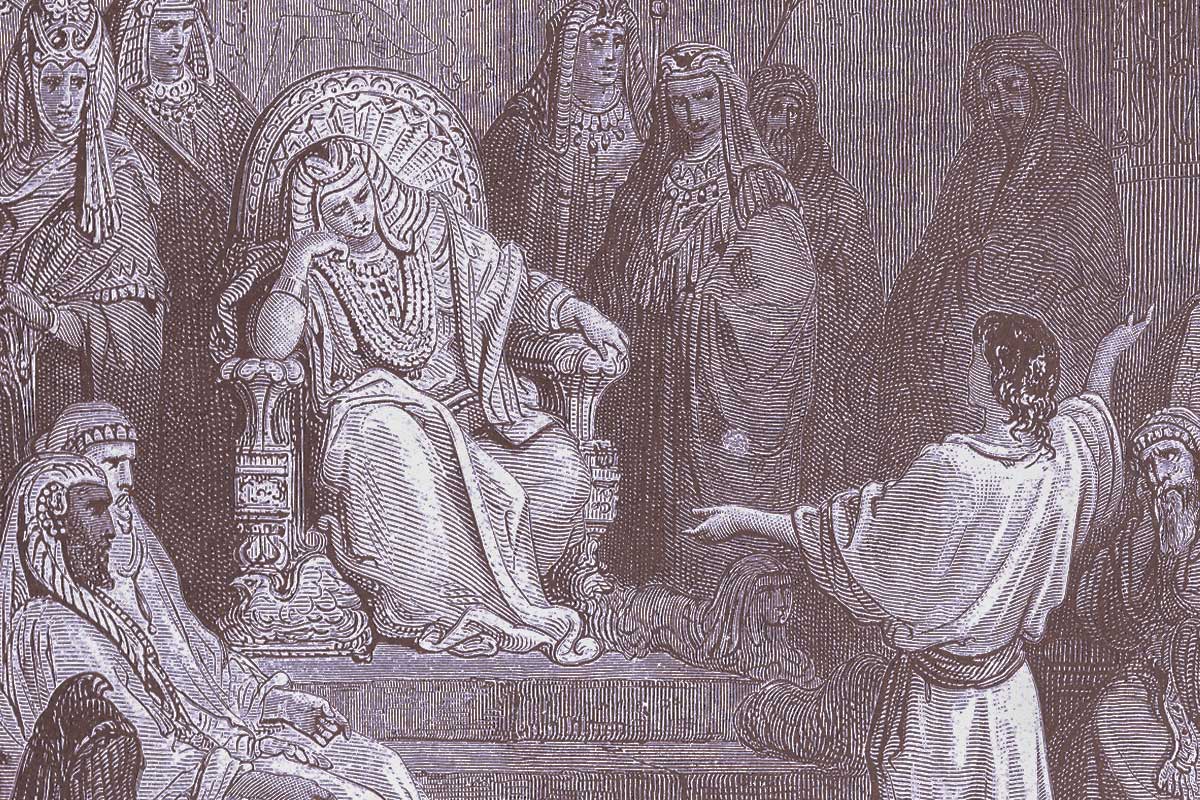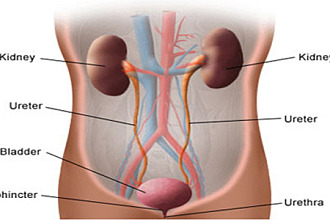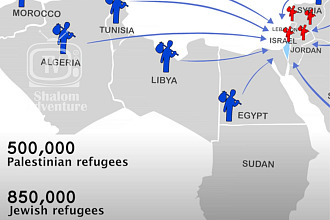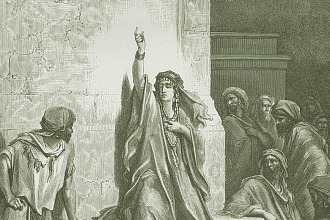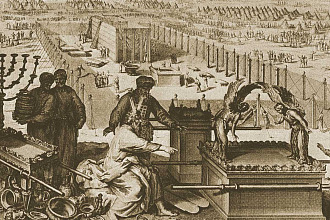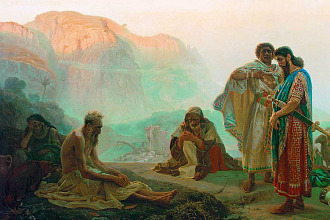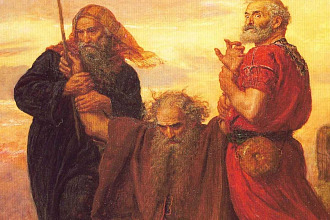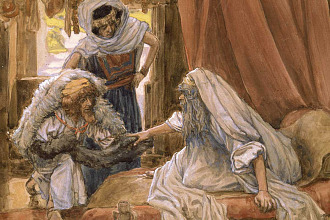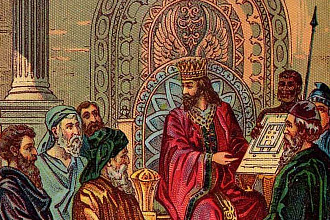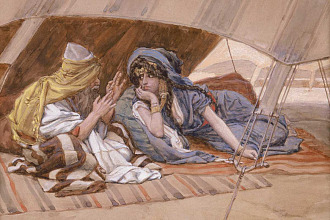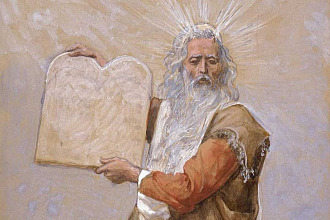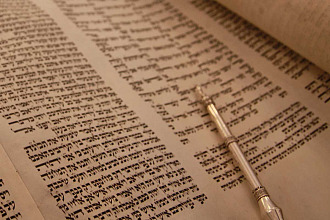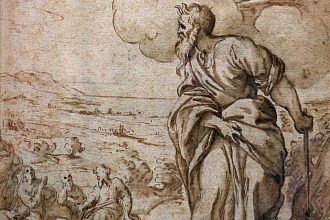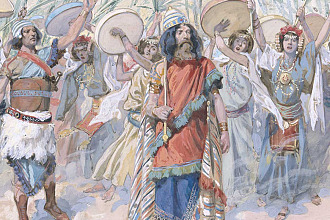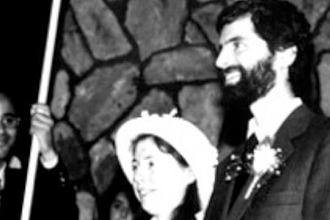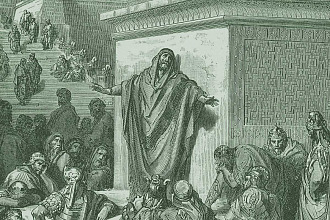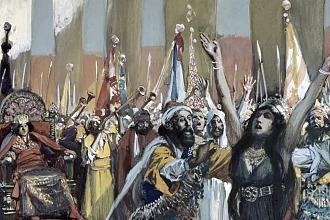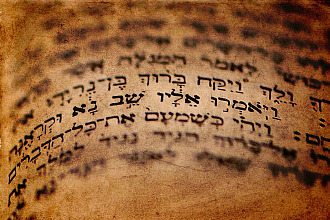Have you ever felt all alone, with no friends or family to understand what you were going through? Have you ever suffered from circumstances beyond your control?
Joseph endured the same predicaments. God carried him through, leading Joseph to a deeper walk with Him.
In Lesson 2 we learned that Jacob (Israel) had to flee from his home because he deceived his brother, Esau. After that episode Jacob had twelve sons and one daughter. These sons became the ancestors of the twelve tribes of Israel. Joseph was the next to youngest of the twelve. Joseph’s story is one of the most touching in all the Torah. To all of us who have been let down, injured physically, or have been emotionally scarred by others, Joseph’s story becomes one that we like to hear over and over again. In this lesson we will explore, and learn, from what happened to Joseph.
1. How did Israel feel about Joseph, and how did he demonstrate it?
Now Israel loved Joseph best of all his sons, for he was the child of his old age; and he had made him an ornamented tunic. Genesis 37:3
This just might have been a nice gift, but it also might have been Israel’s way of showing that he planned to give Joseph the birthright.
2. What emotions were evoked towards Joseph as a result of Jacob’s favoritism?
And when his brothers saw that their father loved him more than any of his brothers, they hated him so that they could not speak a friendly word to him. Genesis 37:4
Although Jacob grew up in a home with favoritism that caused animosity, he did not learn the lesson. Even though it might have felt great to be loved by his father, it must have been hard on Joseph to be hated by his brothers.
3. Joseph had some dreams. What was one of them, and how did his brothers react after hearing about his dream, which left Joseph even more alone and isolated from his brothers?
Once Joseph had a dream which he told to his brothers; and they hated him even more... “Hear this dream which I have dreamed: There we were binding sheaves in the field, when suddenly my sheaf stood up and remained upright; then your sheaves gathered around and bowed low to my sheaf.” His brothers answered, “Do you mean to reign over us?”...And they hated him even more for his talk about his dream. Genesis 37:5-8
Why would Joseph tell his brothers about his dreams? Maybe he had an inflated ego, maybe he was looking for acceptance, or maybe he was just naive and didn’t know it would cause them to hate him even more.
4. While Joseph’s brothers were far away tending sheep, Jacob asked Joseph to go and see how they were doing. When Joseph approached his brothers, how did they manifest their feelings of jealousy and anger towards him?
They saw him from afar, and.... They conspired to kill him.... When Joseph came up to his brothers, they stripped Joseph of his tunic, the ornamented tunic that he was wearing, and took him and cast him into the pit.... Then they sat down to a meal. Looking up, they saw a caravan of Ishmaelites...They pulled Joseph up out of the pit. They sold Joseph for twenty pieces of silver to the Ishmaelites, who brought Joseph to Egypt.Genesis 37:18-28
How sad that sibling jealousy developed into hatred, which led to attempted murder and abduction. How much better if they would have identified their jealous feelings as sin and surrendered them to God. God could have freed them from their angry, insecure natures; and God could have given them love for one another and peace within themselves regarding their place in life. Instead, they sold one of their own kin into slavery for only two silver coins each. They stooped lower into sin as they went home and lied to their father telling him a wild beast killed Joseph. They showed the ornamented tunic stained with blood on it as proof. Israel’s heart was broken for a large portion of the rest of his life. What a sad, sad story. But wait. It’s not over. It gets worse!
5. Joseph was separated from his loving father and rejected by his brothers. Overnight, he went from being the favorite son of a wealthy father to being a foreign slave. Joseph was sold to an Egyptian named Potipher. Joseph did the best he could amidst the loneliness and isolation. He worked hard and faithfully as a foreign slave and was promoted by his owner to be in charge of the house. What did Potipher see in Joseph?
The Lord was with Joseph, and he was a successful man; and he stayed in the house of his Egyptian master. And when his master saw that the Lord was with him and that the Lord lent success to everything he undertook, he took a liking to Joseph. He made him his personal attendant and put him in charge of his household, placing in his hands all that he owned. Gen. 39:2-4
Joseph must have felt heartbroken by what his brothers did to him. He must have missed his father tremendously. He must have felt all alone and scared, but he must have also trusted in the Lord God and found strength & courage in Him because God’s inspired word says the Lord was with Joseph. Joseph must have given all his feelings of anger, revenge, hurt, and sorrow over to the Lord because Potipher saw the Lord in Joseph’s life.
6. Just when Joseph’s horrendously sad life seemed to be showing some hope of better days everything fell apart again. Potipher’s wife tried to seduce Joseph into committing adultery with her. How did Joseph respond, showing that God was first in his life?
He refused. He said to his master’s wife, “…How…then could I do this most wicked thing, and sin before God?” Gen. 39:8,9
7. Even though Joseph did what was right he found himself falsely accused of a crime by Potipher’s wife and thrown into an Egyptian prison. Yet in spite of all these cruel injustices, Joseph trusted in God and chose not to hold onto any feelings of anger or revenge. In spite of the rejection, injustice, and loneliness Joseph was experiencing, what brought comfort to him through these trials and how did God help him?
But even while he was there in prison, the LORD was with Joseph: He extended kindness to him and disposed the chief jailer favorably toward him. The chief jailer put in Joseph’s charge all the prisoners who were in the prison, and he was the one to carry out everything that was done there. The chief jailer did not supervise anything that was in Joseph’s charge, because the LORD was with him, and whatever he did the LORD made successful. Genesis 39:20-23
Do you think the chief jailer would have been favorably disposed to Joseph if Joseph had been steaming with bitterness, anger, and revengeful feelings? Do you think the chief jailer would have promoted Joseph if he was depressed and gloomy, with self-pity, and overwhelming sadness? After what Joseph had been through would he have been justified in having those feelings? Would allowing those feelings to control Joseph’s life have helped him?
Even in a cold, isolated dungeon hundreds of miles from those he loved, Joseph was not alone, because God was with Him. We are never alone, no matter how lonely we feel, when we, by faith, believe God’s promise that He will never leave us nor forsake us. Circumstances may make it appear like God has forgotten us. Joseph was tempted to feel that God had forgotten him. The Torah reminds us that God was with Joseph even when he was rejected by his brothers, separated from his parents, all alone in a foreign land, and cruelly hurt and mistreated. God is with us even when bad things are happening to us. It was faith in this fact that kept Joseph from being depressed and bitter.
8. While in prison, Joseph befriended Pharaoh’s royal cupbearer, who was also in prison. Through God’s power, Joseph interpreted a dream that this man had. What favor did Joseph ask of him in return?
“But think of me when all is well with you again, and do me the kindness of mentioning me to Pharaoh so as to free me from this place...” Genesis 40:14
9. It took two years for the royal cupbearer to remember that request, yet Joseph patiently waited, trusting God in spite of another rejection. Pharaoh had some dreams that he could not understand. His wise men could not interpret them, either. That is when the royal cupbearer remembered Joseph. Joseph was released, and God gave him the interpretation of those dreams. What did Pharaoh dream and what was the interpretation?
Pharaoh’s dreams are one and the same: God has told Pharaoh what He is about to do. . The seven healthy cows are seven years, and the seven healthy ears are seven years; it is the same dream... God has revealed to Pharaoh what He is about to do. Immediately ahead are seven years of great abundance in all the land of Egypt. After them will come seven years of famine, and all the abundance in the land of Egypt will be forgotten... Accordingly, let Pharaoh find a man of discernment and wisdom, and set him over the land of Egypt... Let all the food of these good years that are coming be gathered, and let the grain be collected under Pharaoh’s authority as food to be stored in the cities. Let that food be a reserve for the land for the seven years of famine which will come upon the land of Egypt, so that the land may not perish in the famine. Genesis 41:25-36
10. What did Pharaoh see in Joseph and what did he do for him?
And Pharaoh said... “Could we find another like him (Joseph), a man in whom is the spirit of God?” So Pharaoh said to Joseph, “Since God has made all this known to you, there is none so discerning and wise as you. You shall be in charge of my court, and by your command shall all my people be directed; only with respect to the throne shall I be superior to you. Genesis 41:37-40
This was an amazing turn of events. It is astounding that the Pharaoh would put an incarcerated foreign slave as the second in command of the powerful nation of ancient Egypt. He did it because he saw the Spirit of God in Joseph. Pharaoh would not have seen the Spirit of God in Joseph if for the last two years Joseph had been nurturing negative thoughts such as: “I can’t believe the cupbearer has forgotten me. Some friend! After all I have done for him. That creep. I shouldn’t be in this prison any way. It’s Potipher’s wife who deserves to be in this rat hole, not me. All this for following God and doing what is right. If there really was a God He certainly wouldn’t allow this to happen to me. And those rotten brothers of mine. If I could just get my hands on them.” These are natural thoughts. These types of thoughts must have come into Joseph’s mind many times over the many years he was in Egypt, but he did not entertain those negative thoughts. He gave them to God and put his trust in the Lord.
He chose to forgive those who hurt him. He did not let their wrong actions take away his peace and God’s Spirit. He knew that those negative thoughts would have destroyed him if he did not choose to forgive.
11. God had said there would be seven years of plenty followed by seven years of famine. How did God use this famine to reunite Joseph with his brothers?
When Jacob saw that there were food rations to be had in Egypt, he said to his sons… “Go down and procure rations for us there, that we may live and not die.” So ten of Joseph’s brothers went down to get grain rations in Egypt, for Jacob did not send Joseph’s brother Benjamin with his brothers, since he feared that he might meet with disaster. Genesis 42:1-5
Joseph was now in a position to bring harm to his brothers who had hurt him. During all the years Joseph was apart from his family he never harbored any bitterness. He never cherished ill feelings towards his brothers who had wronged him. Not that he wasn’t tempted with those feelings, but by God’s power, he chose not to harbor, cherish, nor allow those feelings to take root in his heart and mind. When Joseph’s brothers arrived in Egypt, Joseph recognized them, but they did not recognize him. He did not disclose himself to them during their first visit to Egypt. He sent them away with food, but told them they must not come back unless they brought their youngest brother with them also. Joseph had the power to execute them all, but he had forgiven them long before he saw their faces. Because the famine was severe, his brothers eventually had to return. When they did they brought Joseph’s brother Benjamin with them.
12. We can only imagine the emotions Joseph experienced upon seeing his younger brother after being separated for close to 20 years. How does the Torah describe the emotions Joseph had when he saw his brother Benjamin?
Looking about, he saw his brother Benjamin, his mother’s son, and asked, “Is this your youngest brother of whom you spoke to me?” And he went on, “May God be gracious to you, my boy.” With that, Joseph hurried out, for he was overcome with feeling toward his brother and was on the verge of tears; he went into a room and wept there. Genesis 43:30
This must have been a very emotional experience for Joseph.
13. When Joseph finally revealed himself to his brothers, how did he demonstrate that he had forgiven them and that he had trusted in God during these long, difficult years?
Then Joseph said to his brothers... “I am your brother Joseph, he whom you sold into Egypt. Now, do not be distressed or reproach yourselves because you sold me hither; it was to save life that God sent me ahead of you...God has sent me ahead of you to ensure your survival on earth, and to save your lives in an extraordinary deliverance. So it was not you who sent me here, but God.” Genesis 45:4-8
If Joseph had not chosen to forgive his brothers long before this he would not have been able to tell them not to reproach themselves. Joseph could now see the good that God was bringing out of all his troubles. During these hard years Joseph must have held on by faith that God was still in control and would eventually work it out for good. God allowed Joseph to go to Egypt so that many people could be saved.
14. Jacob and all his family moved to Egypt. Eventually, Jacob died. What did Joseph’s brothers fear when their father died?
When Joseph’s brothers saw that their father was dead, they said, “What if Joseph still bears a grudge against us and pays us back for all the wrong that we did him.” Genesis 50:15
Even after all that Joseph had done for his brothers they still didn’t believe that Joseph had forgiven them. They thought he would do what they would do. Joseph’s brothers hadn’t received God’s forgiveness so they hadn’t been able to forgive themselves. They hadn’t experienced forgiveness since they hadn’t repented. Since they had not experienced forgiveness they could not imagine how Joseph could have forgiven them unconditionally. Their lack of repentance did not stop Joseph from choosing to forgive.
15. How did Joseph respond, again showing his forgiveness and trust in God to work all things together for good?
But Joseph said to them, “Have no fear! Am I a substitute for God? Besides, although you intended me harm, God intended it for good, so as to bring about the present result—the survival of many people. And so, fear not. I will sustain you and your children.” Thus he reassured them, speaking kindly to them. “So Joseph and his father’s household remained in Egypt.” Genesis 50:19-22
We are never told if Joseph’s brothers ever received his forgiveness, or if they ever asked his forgiveness, or if they ever received God’s forgiveness. But regardless of how they chose to react to their own evil, Joseph chose not to hold on to any desire to bring them any harm or wish them ill. Now in a position where they could not hurt him, he chose to bless them and do good to them. If he waited for those who hurt him to apologize he would still be waiting today. Joseph’s choosing to forgive was what gave him shalom, true peace.
Joseph’s brothers intended much evil towards Joseph by selling him as a slave, but God overruled for the good of their family, as well as for the good of many other nations. Joseph was able to see past the evil of their betrayal and accept God’s healing spirit of forgiveness toward his brothers. Since Joseph was not harboring anger and bitterness towards those who had hurt him, and since he was choosing to allow God to fill him with a spirit of forgiveness and faith in God, Potipher, the jailer, and the Pharaoh recognized God’s Spirit working in Joseph.
True Biblical forgiveness is not an excusing or an ignoring of the wrongs people have done to us. We do not forgive people when they do good things to us; we only forgive people for doing terrible things. By stating that we forgive someone we are not stating that every thing is OK. It is saying that wrong was done and that it should not be done again. Too often we equate forgiveness with overlooking. We are not speaking about overlooking; we are talking about looking at the fault, acknowledging that wrong was done, and making it clear we do not want or expect it to happen again. At times we need to take action to insure they are not able to do the wrong again. We may have to separate ourselves from certain people who hurt us; we might have to have them put in jail, etc. We could even expect and ask for compensation. If someone does not give you money they owe you, forgiving them does not mean that you do not expect them to pay you back. It means they are wrong for not paying you and that you do expect your money, but at the same time you are not going to allow their wrong to destroy your peace. You are choosing not to hold on to resentful, hateful, sad, or remorseful feelings. We have chosen not to allow their wrong to effect us mentally, spiritually, or emotionally.
They may have hurt us physically or emotionally by what they have done, but if we choose to dwell on it after the fact then we are the ones hurting ourselves. If we choose to be bitter because of their sin, then the bitterness becomes our sin, our problem. We can say we have a right to be bitter because of what they have done, but bitterness only hurts us, not them. You might say you will forgive them and let go of the bitterness when they apologize. In that case you are giving them the “remote” control over you. You are letting them decide when you are going to stop having bitterness destroy you. What if they never apologize? Then you are allowing them to dominate you the rest of your life. You may never see them again, but if you allow the situation to replay in your mind over and over again you are choosing to allow bitterness and anger to destroy you. It has become your sin and it needs to be surrendered to God.
Forgiveness is the recognition that God is stronger than the people who have wounded us. Forgiveness is the recognition that God is stronger than the past. Choosing to forgive—giving the frustration, anger, and hurt over to God—brings healing to us. Joseph was hurt deeply several times by numerous people, but he chose not to live in the past; he decided to trust God, and God turned their evil into good.
We can have God’s Spirit as Joseph had, and rest assured it will heal us of the unhappy, bitter feelings we have because of the wrongs we have suffered. We can accept and trust God’s hand leading and guiding us through every situation in life, and have the same peace Joseph had. What a wonderful gift God wants to give us!
Would you like to be healed of any feelings of hurt, bitterness, or resentment and accept the gift of peace and trust in God right now? Just ask God to take away the harmful feelings of self-pity and sadness, or of hatred and revenge. Now choose to thank God that He has taken those hurtful feelings away. You can do this by FAITH. That means thanking God for removing those hurtful feelings whether you feel any different or not. (However, this does NOT mean you are saying people are right or directed by God to do evil.)
Now ask God to replace your feelings that are hurtful (that He has just taken away) with feelings of joy, peace, and contentment. Ask Him for a godly pity for those who hurt you. Also ask Him to give you faith that He will eventually work this out for good, (knowing that in His time He will bring punishment for evil). Continue to ask for this every time those sad or angry feelings come back. Eventually they will stop disturbing your peace, and God will have full control of this area of your life. He did this for Joseph; He can do it for you. People will soon start noticing how much more peaceful and happy you are.
The lessons from Joseph’s life are certainly encouraging and helpful for us all. The next study in this series will be about Moses and the guidance to be found from his experiences with God. We all know that he had a crucial role in our Jewish heritage. When you complete the review sheet and email it back using the form below.
This lesson is adapted from "Jewish Discoveries," by Jeff Zaremsky, to buy the printed book, click here.

